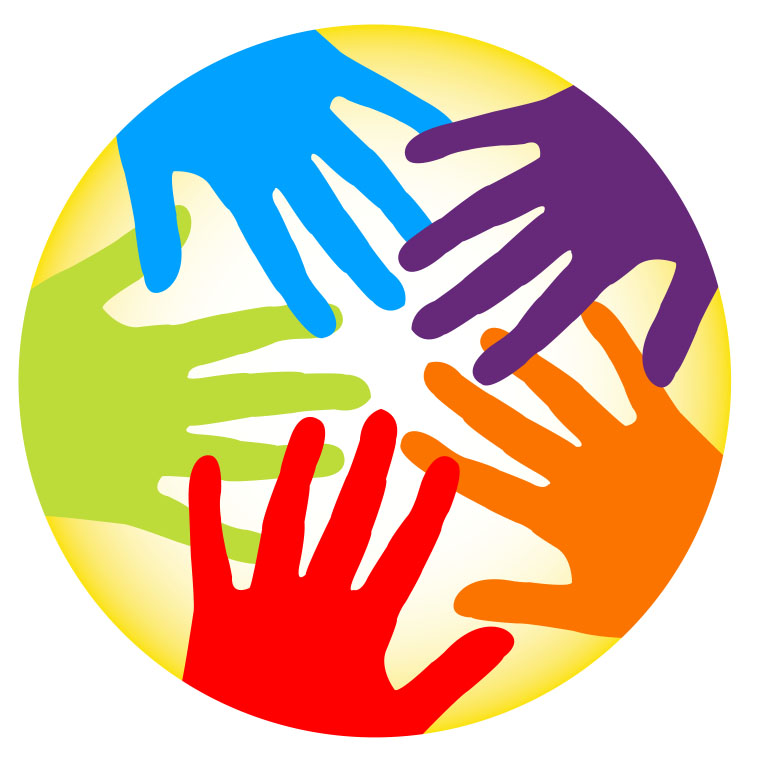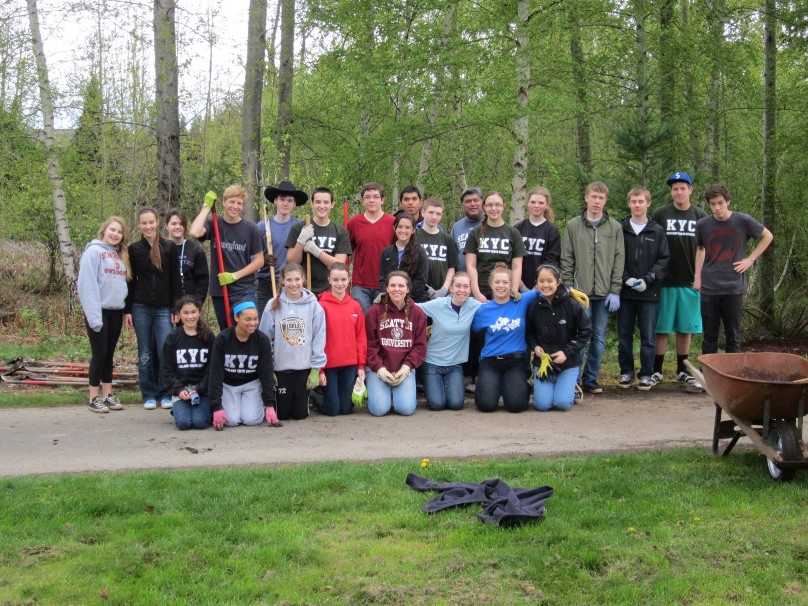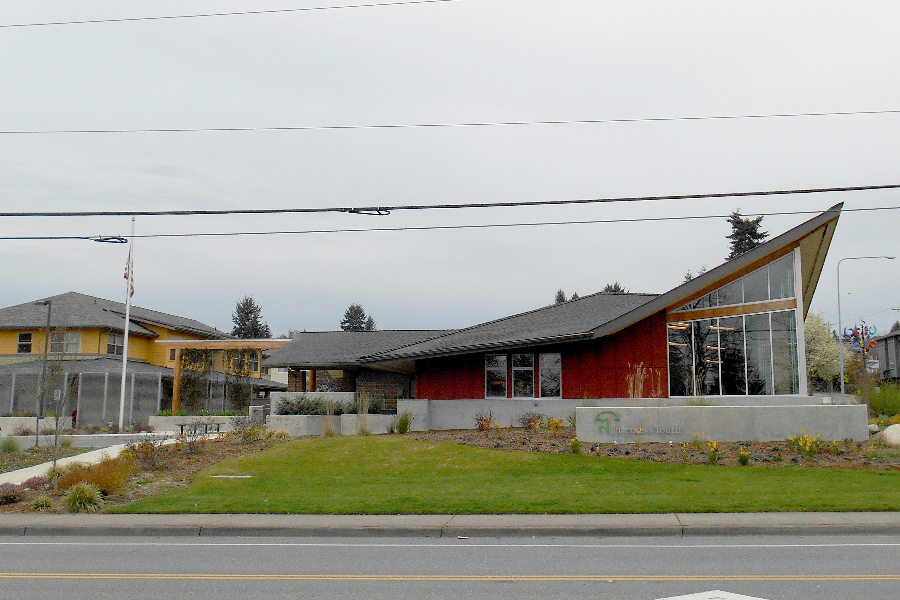C. Human Services Goals and Policies
|
Goal HS-1: Support diversity in City government and in the community by encouraging awareness, acknowledgment and sensitivity, and by being inclusive of Kirkland’s entire populace. |
|
Goal HS-2: Foster a City government and a community free of discrimination and committed to justice and social equity. |
|
Goal HS-3: Build a community in which families, neighbors, schools, and organizations all work together to help young people become engaged, competent and responsible members of the community. |
|
Goal HS-4: Maintain and improve the quality of life for Kirkland residents 50 years and older. |
|
Goal HS-5: Create a community in which all members have the ability to meet their basic physical, economic and social needs, and the opportunity to enhance their quality of life. |
|
Goal HS-6: Encourage human service organizations to make their services physically accessible to all. |
Goal HS-1: Support diversity in City government and in the community by encouraging awareness, acknowledgment and sensitivity and by being inclusive of the entire populace.
Policy HS 1.1: Engage the diverse populations within Kirkland to create an inclusive community.
The Puget Sound region, east King County and Kirkland are undergoing rapid demographic changes. In order to incorporate the strengths that a diverse populace offers, the City should engage and include residents of all ages, socioeconomic status, racial and ethnic groups and faith traditions, and encourage partnerships among them, the City, businesses, schools, faith groups, civic organizations and human service providers. The City should strive to increase participation in City programs, initiatives and activities among its diverse populations.
Goal HS-2: Foster a City government and a community free of discrimination and committed to justice and social equity.
Policy HS-2.1: Work to achieve a community where everyone is treated with respect and given equitable access to resources.
In Kirkland, further assurances of non-discrimination beyond Title II and Title IV should extend to religion, age, socioeconomic status, marital status, family structure, political affiliation, sexual orientation, gender identity and genetic information. Recognizing that public and private institutions should include all people in a respectful manner, the City should offer opportunities for the community to come together to respect differences, embrace diversity, communicate and work to advance more just and inclusive initiatives, programs, activities and strategies that end any discrimination and ensure justice and equitable access for all.
Goal HS-3: Build a community in which families, neighbors, schools, and organizations all work together to help young people become engaged, competent and responsible members of the community.
Policy HS-3.1: Maintain and support the Kirkland Youth Council.
The Youth Council provides an important link between the youth of Kirkland, the government, school district and the community. Their continued work to support youth initiatives should be supported and encouraged.
Youth Council doing service project
Policy HS-3.2: Coordinate with the Kirkland Teen Union Building to provide a safe place for youth and provide recreational/educational activities and social programming.
The Teen Union Building provides a safe place for teens to spend their time and to learn, socialize and do recreational activities. The City should continue to support the Teen Union Building, its staff and programs to provide a safe and rewarding environment for the youth in the community.
Policy HS-3.3: Provide connections between Kirkland youth and their community by partnering with the City, school district, and local youth-serving organizations.
The City of Kirkland values its partnership with the Lake Washington School District and community organizations in helping to connect youth to their community. The Youth Council should continue its goal of connecting students to their community with youth summits, Citywide events and school activities. The City should continue to seek out grant opportunities to provide more school and community programs for youth.
Policy HS-3.4: Provide access to information and services for Kirkland youth.
The City should work with the Lake Washington School District and nonprofit organizations to provide information on social service programs, enrichment classes, teen employment and issues around safe driving, swimming and biking. The Kirkland Teen Union Building, the Youth Council, City classes and the school district are good vehicles for disseminating the information.
Policy HS-3.5: Promote healthy lifestyles.
Leisure time activities enrich lives, prevent social isolation and increase a sense of belonging to the community, as well as offer positive choices for how youth spend their time. Providing positive recreational activities encourages lifelong learning for teens, provides fitness opportunities and promotes healthy lifestyles. Through Kirkland’s partnership with the Teen Union Building, businesses, and nonprofit organizations, the City should help to provide recreational and leisure time activities for youth.
Policy HS-3.6: Establish positive relationships between youth and Kirkland Police.
A goal of the Kirkland Youth Council and the City of Kirkland is to foster a positive relationship between youth and police. The Kirkland Youth Council and the Police Department should continue to explore other ways in which to build positive relationships with the City and youth in the community.
Policy HS-3.7: Support programs working to lower youth violence, substance abuse, depression and suicide in the community.
The City’s youth services programs help to maintain positive relationships with community youth, referring youth to services and preventing risky behavior, such as drug, alcohol, and tobacco use. Efforts are focused on working with the youth after school, on weekends and during the summer when the youth have more free time and thus may get involved with risky behavior.
Friends of Youth center
In addition, the youth services programs should also continue supporting Kirkland’s school and community teen depression and suicide programs to help develop healthy and responsible youth.
The Police Department works with the Lake Washington School District to lower the number of youth who are using drugs, alcohol and tobacco through partnerships, such as the School Resource Officers. The City should continue the Police Department’s partnership with the school district as funding allows to develop and support the drug, alcohol, and tobacco use prevention programs.
Goal HS-4: Maintain and improve the quality of life for Kirkland residents 50 years and older.
Policy HS-4.1: Maintain and support the Senior Council.
The Kirkland Senior Council’s mission is to preserve and improve the quality of life for Kirkland residents 50 years and older by identifying their concerns, advocating for their needs and creating programs and services that advance their well-being. The Senior Council offers people the opportunity to directly participate in the advocacy and creation of programs and services that meet their needs. The City should maintain the Senior Council and support its work.
Policy HS-4.2: Provide opportunities for residents 50 years and older to be active, connected, and engaged in the community.
Many people 50 years and older are active and thus prefer a wider range of recreational programs and services. They enjoy working, recreation, lifelong learning, and social engagement. Recognizing this, the Peter Kirk Community Center should provide a broad range of activities, classes and services for residents 50 years and older to engage and connect the residents with their community.
“Seniors Are Artists” Art Show
The City has developed partnerships with other community organizations and businesses to increase program opportunities and locations, and provide greater marketing abilities. These partnerships should continue and increase as the number of people 50 years and older increase.
Policy HS-4.3: Provide access to information, resources, services, and programs for older adults.
Older adults, their caregivers and family members often do not know where to turn for help for available programs, services, and resources. Many older adults and their adult children lack knowledge about in-home services, assisted living options, and the steps between living in their own homes and moving into retirement, assisted living or nursing homes. Also many older adults need support to increase independence through financial planning and utilization of technology to access information. The Parks and Community Services Department should continue to provide access to resources at Peter Kirk Community Center. The challenges are compounded for the non-English speaking seniors and their families. The Parks and Community Services Department should continue partnerships with agencies to offer programs and services with bilingual staff, so that non-English speaking older adults have the opportunity to participate in social, recreational and educational activities.
In addition, many older adults do not drive or own vehicles so they depend on public transportation or safe pedestrian and bicycle connections to get them to their activities, shopping and medical appointments. The City should work with the regional transit providers to see that convenient and low-cost public transportation is provided throughout the City. A system of safe nonmotorized connections should also be provided from neighborhoods to business centers and public facilities as outlined in the Transportation Element.
Policy HS-4.4: Maintain a safe environment for older adults in the community.
Older adults have the need for safe access to community facilities and services and for emergency responsiveness from both police and emergency medical services. The City should continue an ongoing dialogue to assure older adults that the City is committed to keeping the community safe while also offering a variety of personal safety programs.
The City should encourage partnership programs with various local agencies, such as the Gatekeeper program, to notify specified individuals when seniors fail to pick up their mail or newspapers, or when unattended problems are noticed at the home.
Policy HS-4.5: Encourage affordable and appropriately designed older adult housing.
Affordable and appropriately designed accessible housing are key issues for older adults in terms of what it will take for them to remain in Kirkland as they age. The City should support public and private efforts to create and preserve affordable housing, including accessory apartments, shared housing, small lots, cottages and one-story homes, as outlined in the Housing Element. In exploring options for affordable housing for older adults, the City should utilize the expertise available through ARCH (A Regional Coalition for Housing), the King County Housing Authority, local faith-based organizations with housing programs, nonprofit and for-profit housing developers, and other resources interested in affordable housing for older adults. In addition, the City should identify the necessary changes in land use regulations and building codes that will make alternative housing easier to implement. Additional goals, policies and background information that support affordable and senior housing are found in the Housing Element.
Goal HS-5: Create a community in which all members have the ability to meet their basic physical, economic and social needs, and the opportunity to enhance their quality of life.
Policy HS-5.1: Regularly assess local human service needs, and provide leadership in the development of services to address newly identified needs.
City staff should utilize census data to inform policies that address human service needs. In addition to following demographic change in the community, City staff should keep in close contact with human service organizations regarding the changing needs they are seeing.
Policy HS-5.2: Promote community awareness of human service needs, the resources available to meet those needs, and the gaps in services.
All residents would benefit from an education campaign that explains both the range of needs of residents and the resources available to meet those needs. The City should then act as a convener of community stakeholders to discuss and implement effective community responses.
Policy HS-5.3: Provide funding for local nonprofit organizations serving the needs of Kirkland residents.
Human services are those efforts targeted directly to individuals and families to meet basic human needs, and can be represented on a continuum of services including intervention, prevention, and enhancement. In order to address these needs, the City of Kirkland has five community goal areas that all community members should be able to achieve. These goal areas may change or expand as needs change:
♦ Food to eat and a roof overhead.
♦ Supportive relationships within families, neighborhoods and communities.
♦ A safe haven from all forms of violence and abuse.
♦ Health care to be as physically and mentally fit as possible.
♦ Education and job skills to lead an independent life.
The City Council should continue to allocate General Funds and Community Development Block Grant (CDBG) public services funds to support community-based nonprofit agencies that ensure a broad range of adequate support services are available to all residents, especially low- and moderate-income residents. The City should encourage services that respect the diversity and dignity of individuals and families, and foster self-determination and self-sufficiency.
Policy HS-5.4: Maintain and support a Human Services Advisory Committee.
The Human Services Advisory Committee reviews funding requests from human services providers and makes recommendations to the City Council. The Committee is a valuable resource for the City Council and should be continued to help the City have strong human service programs.
Policy HS-5.5: Commit Community Development Block Grant Funds (CDBG) to affordable housing and house repairs for low- and moderate-income residents.
The City engages in partnerships between jurisdictions and other government agencies, nonprofit and for-profit organizations to enable those organizations to provide and maintain decent and affordable housing for all residents, particularly those at or below the 80 percent of median income. The City commits CDBG and General Funds to provide affordable housing in East King County through nonprofit agencies, such as ARCH. The City should continue to support these agencies and their effort to provide affordable housing to Eastside residents, particularly low-income.
The City also uses its CDBG capital funds to support King County’s program that responds to housing repair needs for low- to moderate-income individuals and families who cannot afford to repair their homes. The City should continue to support this program.
Policy HS-5.6: Participate and provide leadership in local and regional human service efforts.
Meeting human service needs requires a regional solution. The City should continue to work with other jurisdictions and community partners to develop a regional planning effort to identify critical human service needs and to seek regional means of meeting those needs. This includes taking a leadership role on local forums and committees.
Policy HS-5.7: Encourage the development of partnerships among the City, schools, human services providers and others, to address the needs of children and families within the school setting.
The City has supported and facilitated human service organizations providing needed human services within schools. The City should expand these initiatives with the help of additional community partners.
Policy HS-5.8: Ensure human service programs are available and financially accessible.
It is a priority of the City to ensure that programs are accessible to all. To this end, the City should provide programs, and operating and capital funds annually to support social and health needs for those who have special needs, are financially challenged, are homeless, and/or who have limited access based on their language or cultural needs. Where possible, the City should provide language and culturally appropriate programs and scholarships, and accommodations for those with special needs. The City also should collaborate with other jurisdictions and nonprofit entities to assist in meeting the needs of Kirkland residents.
Policy HS-5.9: Prior to adoption, consider impacts to human services of any proposed legislation, including City codes and regulations.
The City should consider both the possible effects of legislation on vulnerable residents as well as create increased opportunities for them.
Policy HS-5.10: Administer community donation programs.
The City offers residents the opportunity to donate funds through programs such as “Kirkland Cares” that assist Kirkland residents through the utility billing process. The City contracts with a local nonprofit organization to allocate these funds to help Kirkland families pay their heating, electric, and water/sewer utility bills, and to provide food, shelter, homelessness prevention, and ongoing support to help families move out of crisis and get back on their feet. The City should continue to administer and promote community donation programs to help those in need.
Goal HS-6: Encourage human services organizations to make their services physically accessible to all.
Policy HS-6.1: Encourage services to become accessible to all in the community by removing any barriers, including but not limited to architectural, cultural, language, communication, and location.
In order to ensure that Kirkland is a place where all people have the opportunity to thrive, the City should encourage and support human service providers to ensure that they are making their services available to those living with a full range of capabilities.
Policy HS-6.2: Coordinate with human services organizations to locate facilities near commercial centers where transit and non-motorized facilities exist.
So that older adults, teens, and those in need can easily access services and programs, the City should locate its facilities in or near commercial centers where transit and non-motorized facilities are available. The City should also encourage other organizations to locate their programs and services near commercial centers. Having transit, bicycle and pedestrian routes near support services facilities ensures accessibility for all. Lastly, the City should encourage community shuttles and volunteer transportation programs and other transportation options.
The City should work with regional transit providers to see that safe, convenient and low-cost public transportation is provided throughout the City. The City should also provide a system of non-motorized connections from residential neighborhoods to commercial centers as outlined in the Transportation Element.



